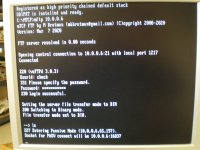If you have found a possible bug in mTCP I'd like to hear about it now before the next release. Please post here for general wish list items, and for possible bugs please email me directly.
So far the next release will have:
(*) A side note on WiFi modems: a lot of people are using them as a way to do serial other the network. Over at TheOldNet.com Rich figured out that the ESP8266 can run a different firmware that has you use SLIP to talk to the ESP8266, then goes through a NAT layer to get on the network. In English that means these devices can put any computer capable of running a SLIP connection on the network via the serial port.
I've done it now with both a new Linux machine and a 386-40 running mTCP. While getting an old machine on the network as a terminal is neat, running TCP/IP natively is still better. That alternative firmware is not perfect but it is usable as-is right now and it has a lot of potential.
That alternative firmware is not perfect but it is usable as-is right now and it has a lot of potential.
Mike
So far the next release will have:
- TCP flow control fixes for even better compatibility and behavior on slow connections
- A UDP fix. (Repeat after me .. Checksums are optional. Checksums are optional.)
- Broadcast Ping
- A more accurate SNTP client
- HTTPServ: proper support for index.htm files and some minor bug fixes.
- Proper HOSTS.TXT type support
- DNS workaround that fixes DNS on "WiFi" modems using NAT/SLIP (*) read more below
(*) A side note on WiFi modems: a lot of people are using them as a way to do serial other the network. Over at TheOldNet.com Rich figured out that the ESP8266 can run a different firmware that has you use SLIP to talk to the ESP8266, then goes through a NAT layer to get on the network. In English that means these devices can put any computer capable of running a SLIP connection on the network via the serial port.
I've done it now with both a new Linux machine and a 386-40 running mTCP. While getting an old machine on the network as a terminal is neat, running TCP/IP natively is still better.
Mike

